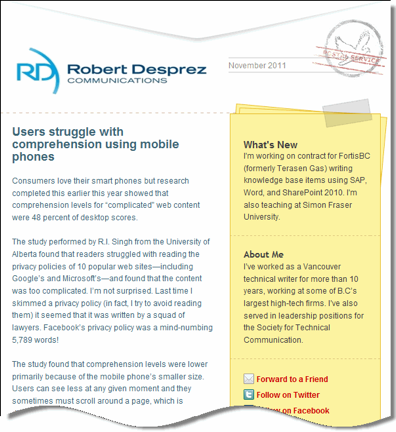Technical writers not posting their online help systems to a server that can be accessed and indexed by Google take the risk that their content becomes overshadowed by a third-party authority such as a support forum, said Joe Welinske, president of WritersUA.
In the same way that marketers have employed Search Engine Optimization (SEO) to improve the visibility of corporate web sites, online help that can be indexed by the search engines can provide faster answers to your customers and potential customers who are using Google, Yahoo, and Bing.
Here are my thoughts on the advantages of adding online help to a public location:
* Your content is given a much wider audience. Instead of limiting your readers to the people who have bought your product, your online help can be made available to anyone on the Internet. If a customer is struggling with a feature of your product, he or she could find the answer using Google’s search.
* The rules of support have changed. People expect quick and relevant answers with the widespread use of Google. Even with the possibility of social media sites superseding search engines, 92 percent of us still use search engines regularly. For example, when I have a problem with something I own, such as a DVD player, I might look up the problem in the printed user guide (if I still have it!), go to the manufacturer’s web site, or just type the name and model of the DVD player in Google. From my experience, Google often provides results that are as useful as the manufacturer’s support web site.
* Adding online help to a public server may benefit the company’s brand. For example, technical writer Sarah Maddox of Atlassian said that the company’s documentation web site attracts more traffic than the company’s corporate web site.
Why are writers not adding content to a public server? A few reasons:
* We are strapped for time. We don’t have the time to move our content to a server that can be accessed by Google’s webcrawlers that troll and index millions of web pages.
* Companies are reluctant to post detailed information to a public server. Conceivably, competitors could read the details of a feature in your online help and emulate it. Other companies may be worried of security breaches. But, in many cases, an external source may already be writing about a company’s product or service, said Welinske, who presented at the Jan. 17th meeting of the STC West Coast chapter.
* We lack the interest or knowledge. We may lack the interest or the know-how to port the content to a public-facing server. You need to consider the type of help you’re generating, the HTML tags that are embedded in each web page, and the formatting of your help.
Here are some best practices:
* Types of help. If you’re planning to post your help, certain file formats work well, such as web pages, WebHelp, and PDFs. Older file formats such as Microsoft Help (i.e. CHM files) or Flash are not the best choices.
* Optimizing meta-tags. To help webcrawlers index the content in your help, spend some time adding HTML tags to each topic. You need to double-check the title tags, review your keywords, and add relevant hyperlinks to your help. See my earlier blog post Making Online Help SEO Friendly.
* Social media. Incorporating social media in your online help is a way to foster an online community of users. See my earlier article on Marrying Twitter with User Documentation.
* Formatting and presentation. In his presentation, Welinske suggested you need to add navigation elements and company branding on all pages so that users know that the content is the company’s material. When you search for content using a search engine, it strips out the table of contents and index so that each page should identify that the content is the company’s documentation. In addition, include the last date that the content was updated and which version the documentation addresses.
* Register your online help with the search engines. It’s worthwhile registering your online help with Google, Bing, and Yahoo. You can register Google using Google Webmaster Tools. It’s also valuable to submit a XML sitemap of your online help to search engines. Sitemaps are a way to tell search engines about all of the pages in your online help.
WritersUA provides training to technical writers and hosts an annual conference.
Good presentation!

 I have worked as a
I have worked as a